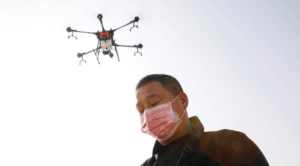Could you imagine the feeling of constant surveillance?
Reflected upon Paula’s idea of limited screen time. We decided that it was effective to have meetings in slots and individually work the remaining time. So we splitted up and worked on ourselves on different topics:
- Surveillance
- Awareness
- Delivery
- Disinfection
- Emotional aspects
We recognized that working on our own as well as having the opportunity to go out and work outside would be great to have a shift in motivation and not just be in front of the computer all day.

We decided that tomorrow, we will go outside and try to act like human drones, in order to improve our understanding of emotional feelings about the use of drones. We will also suppose that a drone will be watching us while we'll be walking around the city and we'll try to imagine how people's behaviour could change when it takes place. In forehand to this idea, we have considered how it would be like to have our technology, the drone, around us. Have we experienced the feeling of surveillance? Something flying over us permanently? Probably not. However, it is precisely this question of the experience of constant surveillance that is very exciting to ask. And if it is just a lack of habitualization. In comparison to China for example, where there is a completely different level of constant surveillance. Where it is being accepted and even desired in exchange for safety. This were questions we were wondering about and trying to imagine how it would be for us to have something like that technology around us all the time.
Not only having a drone flying around us may feel uncomfortable and can stem a feeling of loss of privacy, but can make people feel paranoid or on the other hand prevent loneliness and enhance a factor of security and safety in the streets.

The aspect of surveillance which the drone very much evokes the Orwell’s 1984 environment. Some fear that the mass usage of police drones is not a part of the solution to prevent Coronavirus spreading but rather it falls back on tech-solutionism. In other words, deploying a new technology to this issue is like putting a digital plaster on the damage but it does not contribute to the real solution for the root of the problem.
In addition, Daniel will use his drone tomorrow to record some videos to share with us, and we are going to make a reaction on that.